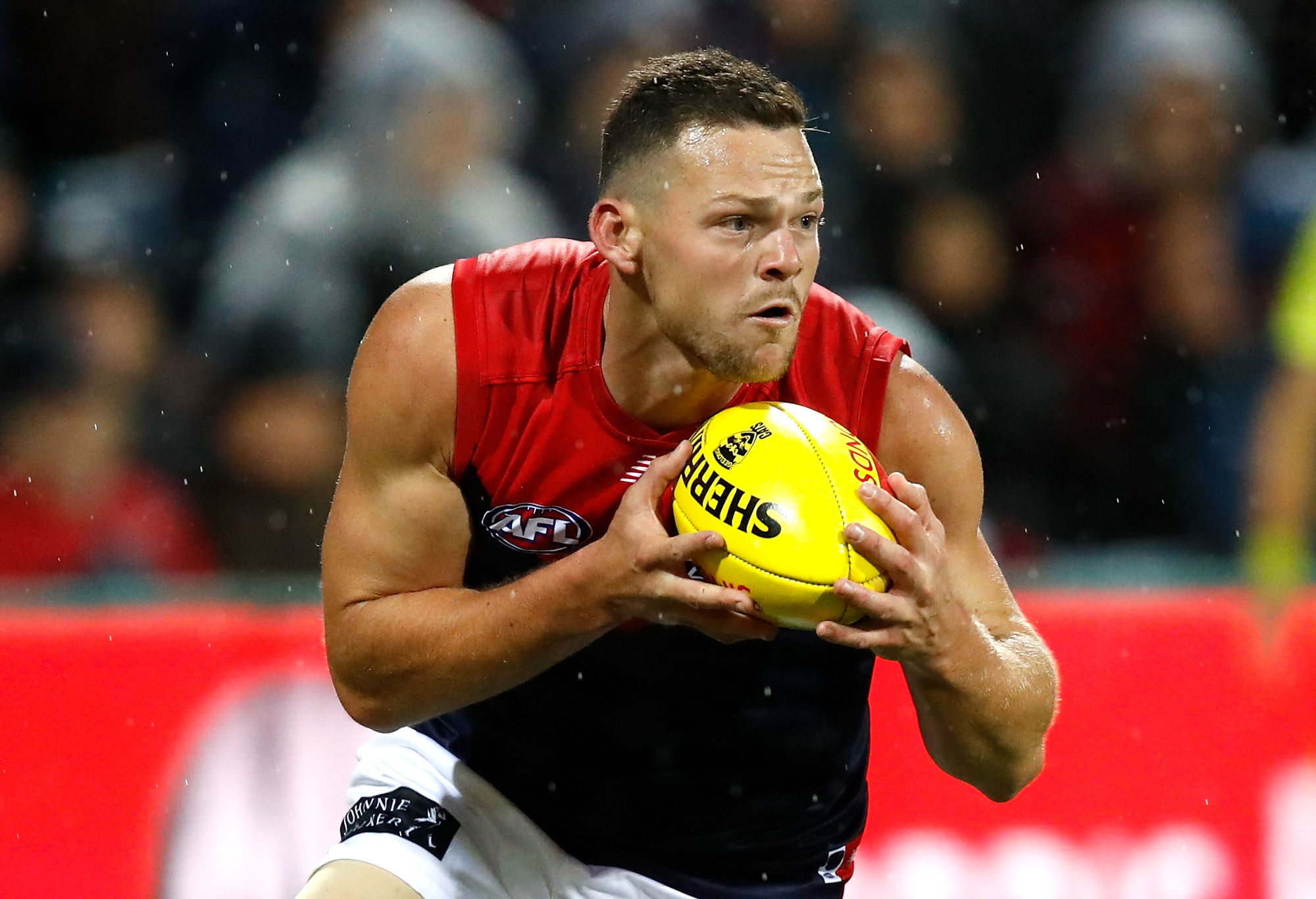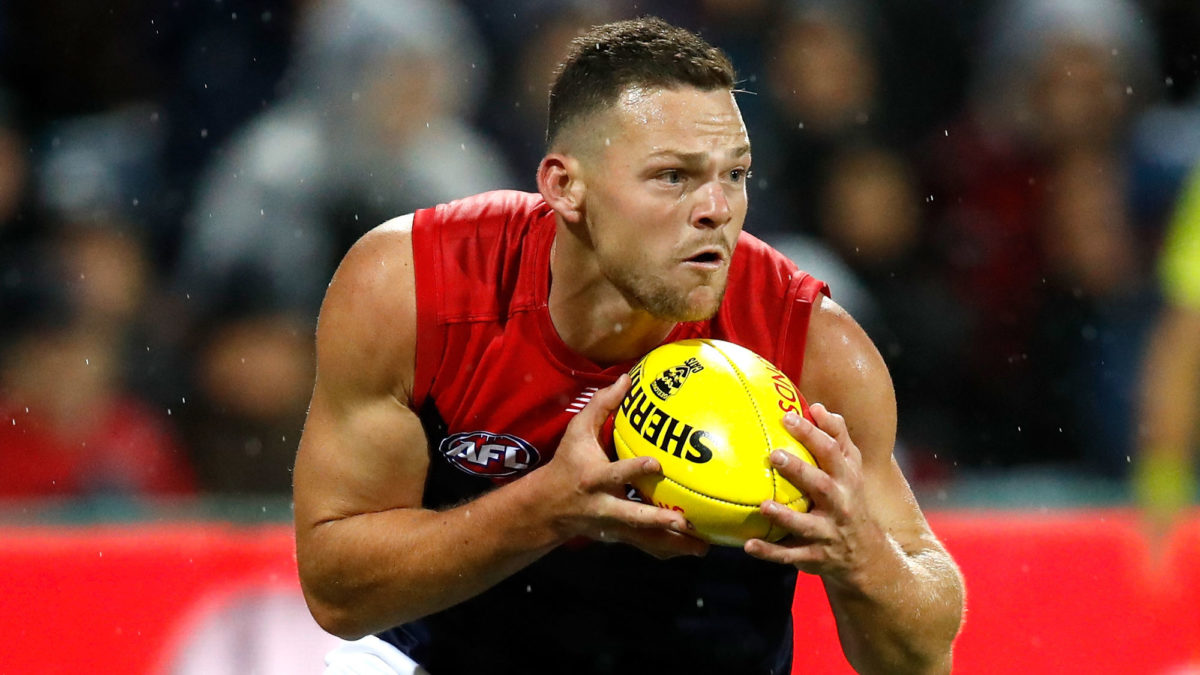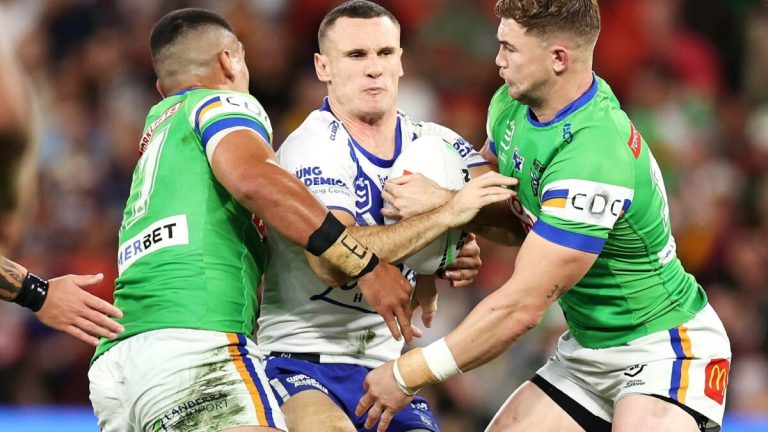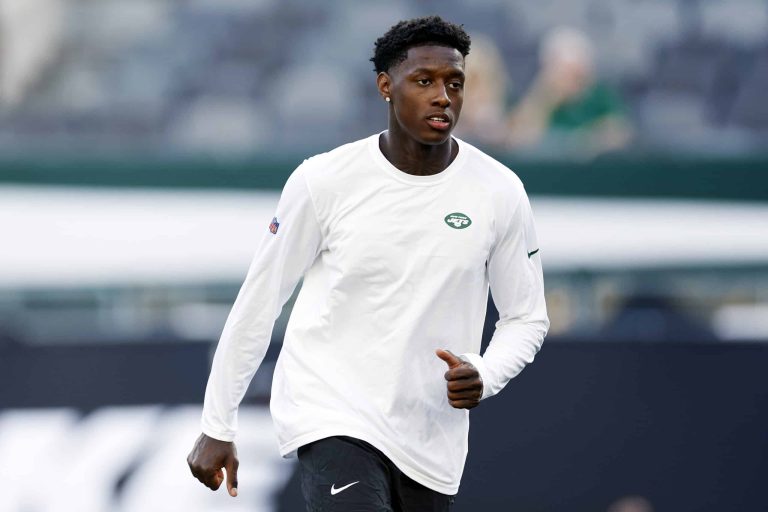Steven May will miss Melbourne’s next two matches after his appeal over a three-game ban failed.
The Demons defender was banned for the round 20 game against St Kilda, which he had to sit out for anyway due to concussion protocols, but this latest decision means he will also miss the remaining games against West Coast and the Western Bulldogs.
May was not involved in Monday night’s appeal hearing to overturn the suspension handed down by the AFL Tribunal for his controversial collision with Carlton forward Francis Evans, just over a week ago.

He was sent straight to the Tribunal by Match Review Officer Michael Christian after the incident, which left Evans with a broken nose, a lost tooth and a concussion, was graded as careless conduct with high contact and severe impact.
In a marathon hearing last Wednesday, the Tribunal deliberated for nearly 100 minutes before granting the AFL’s requested penalty of three matches.
The club maintained that it was a football incident and that the Tribunal made an error of law, and that with the evidence provided, it should not have come to the decision it did.
A large component of the Dees case was that it was unreasonable to expect a football player to predict the bounce of an oblong ball.
“The Tribunal has abandoned common sense,” The Demons legal representative, Jack Rush argued.
“No reasonable Tribunal would have expected the ball would carry a trajectory completely different to the trajectory it had carried up until that point. That is putting an onus on a player that is unreasonable.
“It’s not until the last microseconds that the ball bounces the other way… the Tribunal has put a sense of perfection on the reasonable player.
“We say it’s a retrospective analysis, not a prospective analysis of the way the event occurred.”
Mr Rush went on to claim that the Tribunal made several ‘assumptions’ in its findings, which they never questioned May about, or gave him a chance to respond to, and they did not take the biomechanist’s evidence into consideration enough.
Particularly, the club argued that May took action to minimise the collision, but the Tribunal failed to recognise that, which amounts to procedural unfairness.
“We are bewildered as to what is expected of the reasonable player,” Mr Rush said.
Nick Pane, representing the AFL, denied that May didn’t have a fair hearing, explaining that in the context of a sports tribunal, the player’s evidence was extensive, lasting around three hours, where he gave comprehensive reasons; therefore, the Tribunal’s decision was not unreasonable.
The Appeals Board took just 15 minutes to reject Melbourne’s case, upholding the three-game ban.
“Having watched the video a number of times, having read the transcript of the evidence below and the report of the biomechanist, we have to conclude that we are satisfied May understood the case that was being put against him,” Appeals Board chair Will Houghton said.
“He had every opportunity to put forward his own case.
“We consider that because of the advantages May had in terms of retaining counsel and having counsel give very learned submissions to the Tribunal, he was not denied procedural fairness.
“The second point raised with us during the course of the hearing was the concept of unreasonableness. That is, could the Tribunal possibly come to the conclusion that it did?
“Rush again gave us a number of examples as to why the decision of the Tribunal was unreasonable. Those examples mainly revolved around video evidence of what I might call the four bounces of what Rush described as a fickle football.
“The great benefit that the Tribunal below had was, of course, studying the video. They also had the advantage of seeing the player give evidence, both in chief cross-examination and in re-examination.
“It’s clear to us, it was open to the Tribunal to come to the decision that it did.
“We stress, as we’ve said in past appeals, it’s not the job of this Appeal Board to re-agitate factual disputes that went on in the Tribunal.
“Our job is to see whether the decision of the Tribunal was tainted in some way by errors of law or unreasonableness, or a couple of other grounds that didn’t play a part in this appeal.
“There was no unreasonableness in the decision that the Tribunal came to.”
In explaining the sanction last week, the Tribunal panel agreed with the AFL’s interpretation of the incident, saying May should have ascertained earlier than he did that he would be second to the ball.
“We find that at the moment that May changed direction and ran towards the ball, a reasonable player would have realised that it was highly likely that Evans would reach the ball before May did,” a Tribunal statement from Chairman Jeff Gleeson read.
“There was, of course, the possibility that, if everything went right, from May’s perspective, he may reach the ball at about the same time as Evans, but only if the ball only bounced low and fast on every bounce away from Evans and towards May. We find that when May changed direction, a reasonable player would have realised that there was little, if any, chance that May would reach the ball first.
“The most he could have hoped was that he would arrive at about the same time as Evans, and as we have said, it was far more likely that he would reach the ball after Evans.
“May then accelerated towards the ball. He appears to have made no allowance for the likelihood that Evans would reach the ball first. In the circumstances, he should have done so.
“May could and should have realised before the last bounce that he remained unlikely to get to the ball first. By the second last bounce he could, and should have realised that Evans would reach the ball first and likely take possession of the ball.”
The Tribunal also disagreed with the Demons’ claim that May had insufficient time to avoid the contact, saying he did have ‘reaction time’ to ‘retract’ his arms before the collision.
“May ran a sufficient distance and had sufficient time with an unimpeded view of what was before him to determine what he could and should do in the likely event that he did not reach the ball either first or at the same time,” the statement read.
“The collision resulted in a concussion to a player, and that collision was caused or contributed to by a failure by May to take reasonable care.
“A reasonable player in today’s game would not have collided with Evans in the manner that occurred here.”
Late last week, following the tribunal verdict, Melbourne coach Simon Goodwin revealed May was left ‘shattered’, declaring that his defender always had a “play at the ball”.
“We think he had a play on the ball and it was a football incident,” the Melbourne coach said.

Steven May. (Photo by Dylan Burns/AFL Photos)
“But you can see it’s divided a lot of the public and I think it’s one of those cases where everyone wants it to go through the appeals and see what the outcome is going to be.
“He was shattered, he was disappointed with the outcome and clearly frustrated.
“This is part of the process, go through the appeals, get the clarity required and we’ll all move forward post that.”
Debate immediately erupted around the football world over the ruling at the time of the incident, with Fox Footy’s Ben Dixon saying the ban was ‘rubbish’ on First Crack Preview.
“Eight inches that ball bounces the other way, Steven May gets that ball,” Dixon argued.
“What they’re saying now is, we’ve got a contact sport into a caution sport. So you’ve got to approach that with caution. That’s the fabric of our game.”
However, co-panellist David King, who has argued throughout the week that May should be banned, argued he should have ‘missed the head’.
“The AFL are clearly saying the game has changed, and you now have to assess your role and the duty of care to the opposition from there forward – I fundamentally agree with that,” he said.
“If you’re out of control arriving, having made that decision, you’re in trouble, which I think’s a good thing for the game.
“The AFL are arguing the decision to absolutely be going flat chat with a collision inevitable, you have to make sure you miss the head.
“If you’re going to go for the ball like that, you have to get lower than the head.”
– with AAP





